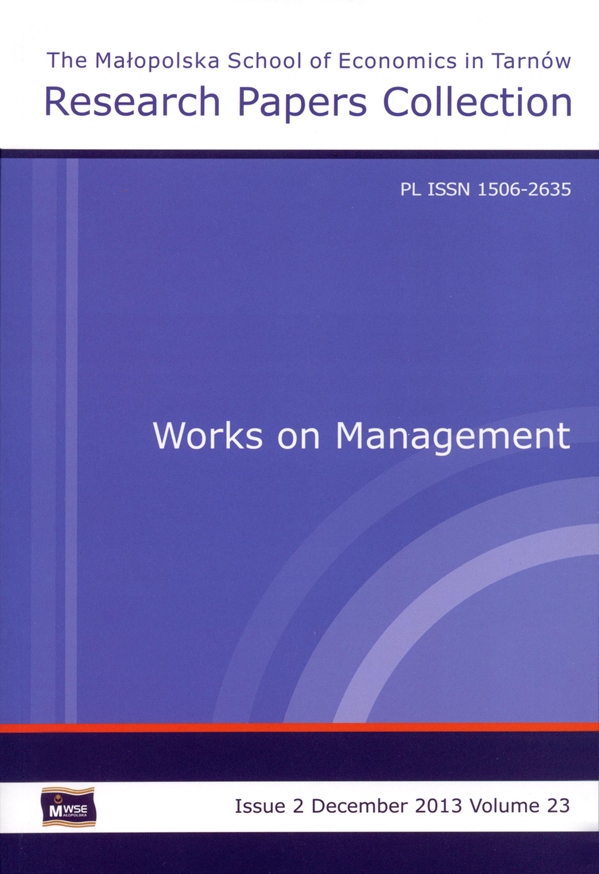Abstract
The amendment to the Education Act extended the mandatory tasks of school to the obligation of providing support in preparing students to enter the profession together with the area of future study. This article is an attempt of diagnosis of the school career counselling based on the research conducted in secondary schools and upper-secondary schools of Tarnów County. The purpose of the article, addressed mainly to the teachers, is to draw attention to the problems connected with the students school support (in the phase of career planning and further education) and effectiveness evaluation of the school career counselling in the context of students expectations. The first, theoretical part of the article presents an overview of formation of the decision making entity. In the second part of the paper, beginning with the sixth chapter, the results of research conducted in the last ten years in secondary and upper-secondary schools of Tarnów County are presented. The first secondary school studies confirmed the dramatic demand for advisory assistance, which was one of the essential prerequisites to create a network of school guidance centres at secondary schools. A recent study showed the progression of advisory activities. Also, the structure of support expected by the students has changed. Online students, unlike their older colleagues, do not expect help in planning but support in understanding their personality. At the end of the article, apart from the conclusions, a recommendation for widespread school career counselling is included.
References
Bauman Z. Ponowoczesność jako źródło cierpień. Warszawa: Sic!, 2000. ISBN 83-88807-43-9.
View in Google Scholar
Czerepaniak-Walczak M. Niepokoje współczesnej młodzieży w świetle korespondencji do czasopism młodzieżowych. Kraków: Oficyna Wydawnicza „Impuls”, 1997. ISBN 83-086994-1.
View in Google Scholar
Kargulowa A. O teorii i praktyce poradnictwa. Warszawa: Wydawnictwo Naukowe PWN, 2004. ISBN 83-01-14224-3.
View in Google Scholar
Kozielecki J. Koncepcje psychologiczne człowieka, Warszawa: Wydawnictwo Akademickie „Żak”, 1998. ISBN 83-86770-47-3.
View in Google Scholar
Kozielecki J. Psychologia procesów przeddecyzyjnych. Warszawa: Państwowe Wydawnictwo Naukowe, 1969.
View in Google Scholar
Kwiatkowski S.M. “Kształcenie zawodowe – główne problemy i wyzwania: Kształcenie zawodowe. Rynek pracy. Pracodawcy”. In: Kształcenie zawodowe, rynek pracy, pracodawcy. Ed. S. M. Kwiatkowski. Warszawa: Instytut Badań Edukacyjnych, 2000. ISBN 83-87-925-28-4.
View in Google Scholar
Lelińska K. “Charakterystyka procesu wyboru zawodu”. In: Przygotowanie uczniów do wyboru zawodu na lekcjach pracy-techniki. Ed. W. Rachalska, K. Lelińska, J. Wołejszo. Warszawa: Centrum Doskonalenia Nauczycieli im. Włodzimierza Spasowskiego, 1990.
View in Google Scholar
Leńczuk M., Szczygieł M., Chrześcijanek A., Guzik E. Doradztwo edukacyjno-zawodowe w Małopolsce. Kraków: Wojewódzki Urząd Pracy w Krakowie, 2012. ISBN 978-83-62384-91-4.
View in Google Scholar
Łobocki M. Teoria wychowania w zarysie. Kraków: Oficyna Wydawnicza „Impuls”, 2005. ISBN 83-7308-234-4.
View in Google Scholar
Mysior R. Plany i aspiracje edukacyjne uczniów szkół gimnazjalnych Tarnowa i powiatu tarnowskiego. Lublin: Wydawnictwo Katolickiego Uniwersytetu Lubelskiego, 2013. ISBN 978-83-7702-715-8.
View in Google Scholar
Piorunek M. Projektowanie przyszłości edukacyjno-zawodowej w okresie adolescencji. Poznań: Wydawnictwo Naukowe UAM, 2004. ISBN 83-232-1365-8.
View in Google Scholar
Rogers C.R. “Uczyć się, jak być wolnym”. In: Przełom w psychologii. Ed. K. Jankowski. Transl. by K. Jankowski, A. Kołyszko, P. Kołyszko. Warszawa: Czytelnik, 1978.
View in Google Scholar
Szajek S. System orientacji i poradnictwa zawodowego. Warszawa: Państwowe Wydawnictwo Naukowe, 1989. ISBN 83-01089-73-3.
View in Google Scholar
Szymański M.J. Młodzież wobec wartości. Próba diagnozy. Warszawa: Instytut Badań Edukacyjnych, 2000. ISBN 83-87715-75-1.
View in Google Scholar
Wojtasik B. Warsztat doradcy zawodu. Aspekty pedagogiczno-psychologiczne. Warszawa: Wydawnictwo Szkolne PWN, 1997. ISBN 83-01-12265-X.
View in Google Scholar
© Copyright by Małopolska School of Economics in Tarnów. The articles are available under the Creative Commons Attribution NonCommercial-NoDerivatives 4.0 International License


